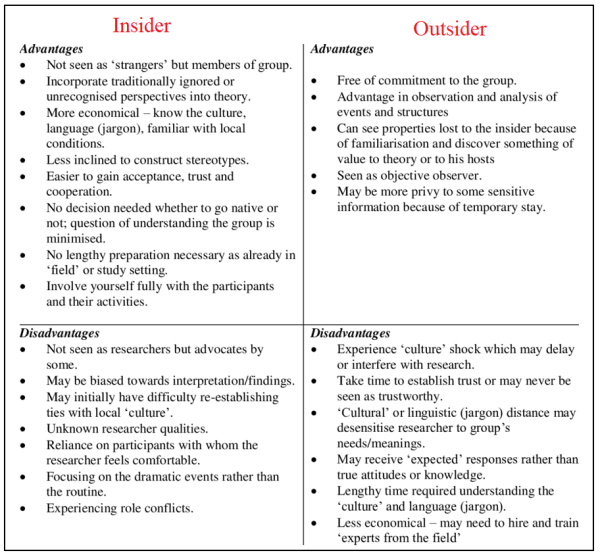The debate around insider positioning in research has been longstanding within social science theory and literature. Many researchers have contended the advantages and disadvantages of being an insider researcher, questioning both definition and validity, with limited consensus. In this blog, I will explore this debate, highlighting key arguments within the literature and reflecting on my own experience of being an insider researcher during my PhD.
If you are just starting your research career or have not undertaken qualitative research, then you may never have heard of such debate and may therefore not know what the terms insider or outsider mean. In its basic terms, insiders are researchers that are part of the community in which they are conducting research and outsiders are researchers that are considered to be outside of the group they are studying (Hellawell, 2006). Insiders tend to share an identity and language with the study participants (Asselin 2003), whereas outsiders have limited knowledge and understanding of the experiences of those being studied. To demonstrate this in the context of my research, I was a nurse, studying a group of nurses in the hospital where I worked and therefore was very much an insider. In comparison, within this context, someone who was a non-health care professional and had never spent any time in a hospital would be very much an outsider.
As mentioned above, there are many arguments for and against being an insider or outsider with advantages and disadvantages of both (see table 1).

Table 1 Advantages and Disadvantages of being an Insider/Outsider (Bonner et all 2002)
The literature does outline the many benefits of being an insider researcher with one of those being acceptance. Researching in a field in which one is a member can allow for complete acceptance from the participants and can lead to an increased trust and openness. This in turn potentially enhances the depth of the data gathered and therefore allows for a greater understanding of what or who is being studied. Not only does this allow for rich data to be gathered but is also advantageous in terms of the time spent researching as there is no settling in period.
The advantage of quick acceptance was something I experienced when conducting my research. My other PhD colleagues were organising “settling in” periods in which they spent time with their participants to build a rapport and develop understanding of the context in which they were researching, whereas there was no need for me to do that. I was able to jump straight in to collecting data as the participants knew who I was and the relationship was already built so they felt comfortable being open with me from the first day. However, this complete acceptance wasn’t without its setbacks. When interviewing, the participants would often skip over some details, as they knew I already had an understanding of the topic. For example, on more than one occasion, an interviewee made reference to the fact that I “already knew that” so I had to be sure to ask them to fully explain what they meant, as they would if I was not a nurse.
Despite the advantages of insider researcher, there is a strong argument against insider positioning due to an increased risk of bias in interpretations and findings. Being a member of the setting under investigation poses questions about the objectivity, reflexivity and authenticity of a research project and there are ongoing concerns that insider researchers are often too close to the project. It is possible that preconceived ideas can guide the way in which the study progresses and therefore personal experience has the potential to influence the data collected and ultimately the claims made. Similarly, another argument against insider positioning is the conflict that arises between roles. The dual role of an insider as both a researcher and a member of the community can often result in role confusion in which researcher responds to the participants or analysis the data from a perspective other than that of researcher. In addition to this, the dual role can often lead to a problem with loyalty in that the researcher does not want to make claims that criticise the group in which they are studying and also a member of.
Although I didn’t question my roles during data collection or analysis, I did struggle with feelings of loyalty to my profession and at times I didn’t always feel comfortable with what the data revealed. I had a good relationship with my supervisors so was able to share these concerns with them and we worked through these feelings of disloyalty together. As time passed, it became clearer to me that these feelings of discomfort were temporary and actually, the long lasting influence that my research would have was more important. Reflecting on this, I would argue that this could have happened to any researcher whether an insider or outsider. Due to the length of time spent in the field when conducting qualitative research, strong relationships are built between researcher and participants, which can therefore leave anyone open to the feelings of disloyalty and discomfort which I experienced.
Although the evidence base attempts to identify whether being an insider makes a better or worse researcher, I would argue that it in fact, it just makes a different researcher. I understand that being a member of the setting being explored leaves researchers open to pre-conceived ideas and potential bias but I also think it allows researchers to be more in tune with the participants. The increased knowledge and experience of the field allows for a deeper understanding of the context in which the findings are situated and perhaps provides a wider picture than what is being observed and discussed.
The concerns with regards to bias and objectivity are valid, however unlike quantitative research in which participants are represented in numerical terms, I would argue that actually qualitative researchers are unable to have a distant researcher role regardless of whether they are an insider or not. As Rose (1985) explains, there is no such thing as neutrality in qualitative research; there is only a greater or less awareness of one’s biases. Similarly to the way in which trustworthiness is assessed in qualitative research, perhaps the decision as to whether insider/outsider positioning has an effect on research is not ours to makes, perhaps, all we can do is make our position clear and allow the readers to make the decision themselves. I believe, as long as there is ongoing reflection, constant questioning and a declaration of position given, arguably there is no debate to be had.

Figure 1 Tips for insider researchers
Author
Dr Emily Oliver [1] is a Consultant Admiral Nurse working for Dementia UK, visiting Fellow at the University of Southampton and Florence Nightingale Scholar. Emily recently completed her NIHR Clinical Academic Doctorate at the University of Southampton, in which the focus was relational care for people with dementia in acute hospital wards.
References:
Asselin, M.E., 2003. Insider research: Issues to consider when doing qualitative research in your own setting. Journal for Nurses in Professional Development, 19(2), pp.99-103.
Bonner, A. and Tolhurst, G., 2002. Insider-outsider perspectives of participant observation. Nurse Researcher (through 2013), 9(4), p.7.
Hellawell, D., 2006. Inside–out: analysis of the insider–outsider concept as a heuristic device to develop reflexivity in students doing qualitative research. Teaching in higher education, 11(4), pp.483-494.
Rose, P. (1985). Writing on women: Essays in a renaissance. Middletown, CT: Wesleyan University Press